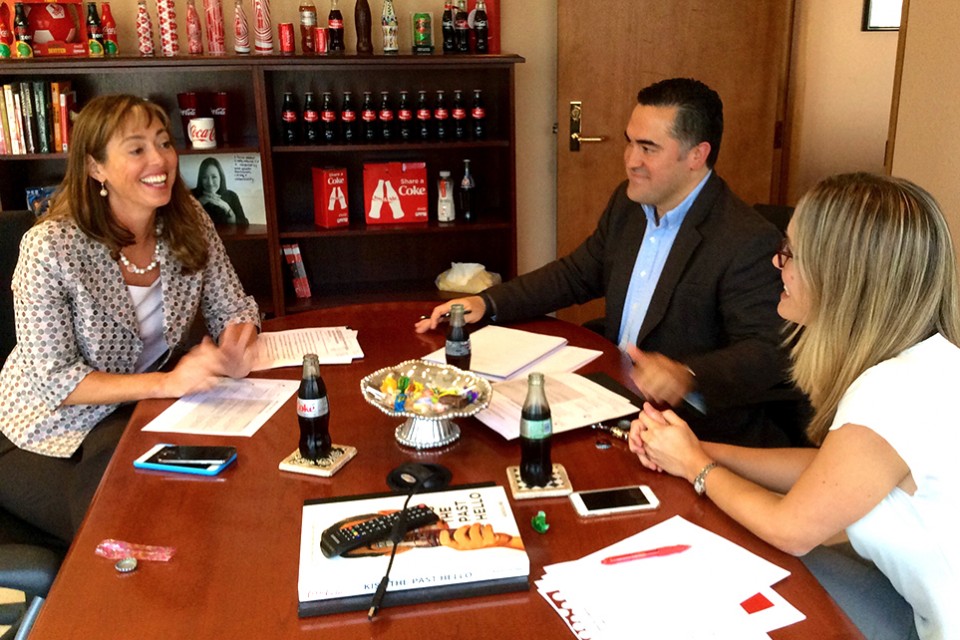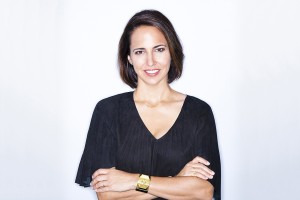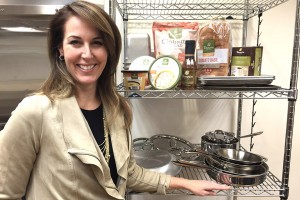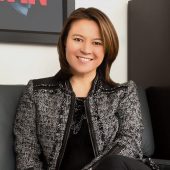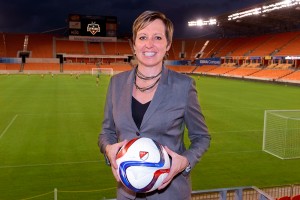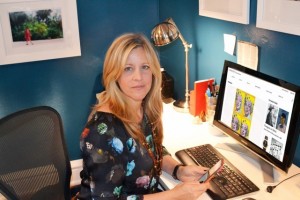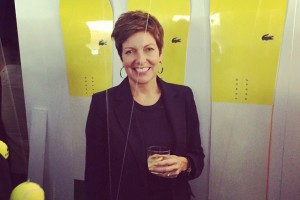Monica McGurk, SVP of Strategy & eCommerce at Coca-Cola, Harvard Alumna, and Novelist
Originally from a “very, very small town” in Minnesota, Monica McGurk, traveled east to Harvard University for college — and then, by her own account, traversed several career realms: “consumer innovation practice;” taking time to help companies focus on the “organizational issues” of culture, leadership, transformation and capability-building; a stint in “heavy operations,” followed by one in banking, and then helming a “big-data enabled platform focusing on higher education” – until arriving at her present role at Coca-Cola as the SVP of Strategy, Decision Support & eCommerce for North America.
In addition to her executive role at Coca-Cola, she has a diverse range of projects and passions, encompassing: an advocate on social issues for young women (anti-trafficking), driving growth for the Florida Opportunity Scholars program as a board member for the University of Florida Alumni Association, and showcasing strong women as a novelist, just finishing her second book, a fictional thriller, Dark Rising.
She is a fan of starting the morning with bacon and eggs, plus a good latte, and then a quick look at news feeds and social media. Once that is taken care of, and she is in office-mode, she hews to some go-to rules for the workplace, including: “Do say no when you can’t deliver” and “Don’t drop the ball on commitments.” She also credits a background of modest means for giving her the mentality of always looking for constructive solutions.
Other recommendations: an easy, confidence-building power outfit can be found by the pairing of a chunky necklace and great shoes, and the book Mindset, by Carol Dweck, which she wishes everyone in America could read! She also provides some interesting thoughts on the eternal conundrum of the American career woman: the issue of work/life balance, and how early to start planning for it.
Can you tell the readers a little bit about yourself?
I am a mom of three children, an executive, a passionate advocate in the fight to end human trafficking (particularly domestic minor sex trafficking – DMST — right here in the US), and a writer (my second novel, Dark Rising, was just released and is available on Amazon.com and other online bookstores). My writing and anti-trafficking work are a bit combined right now, as the trilogy I am working on incorporates trafficking into the plot, and a portion of the profits from book sales are being donated to nonprofits working to permanently end DMST.
What does a day in your shoes typically look like?
I start out my day fairly consistently by drinking a double latté, checking my social media and news feeds, running or meditating, and eating breakfast. I then get my kids out the door for school. Once in the workplace, my day is typically filled with meetings!
What 2-3 things do you do to prepare yourself before work, and is there anything you try to accomplish every day?
Of course, my morning rituals are a big part of how I prepare, so I am centered and focused. Additionally, I review my agendas and any pre-reads the evening before to be sure I am ready for all my meetings, and in order to be respectful of the effort others have put into their own preparation.
As for daily goals: I always try to make a serious dent in my to-do list, and I try to make sure that I have helped someone, even in a little way, every day.
What is your breakfast of choice?
Bacon and eggs.
What are your rituals or tips for staying energized and motivated?
Eat. Exercise. Laugh. Also, regularly assess how and with whom you are spending your time.
What is the favorite part of your job?
I get to work on really thorny problems and strategic questions. A lot of what my team aspires to do is “see around corners,” which requires the right balance of analytical capability and creativity.
What and who inspires you at work?
I am greatly honored and humbled to have the opportunity to be a part of one of America’s – indeed, the world’s — most iconic brands: a fantastic, optimistic and democratic brand. I am inspired by my team and colleagues. And in a more personal way, I am inspired by the example set by my grandparents and parents, who showed me day in and day out the value of hard work and perseverance.
Do you have a ‘Power Outfit’ that you wear for a big meeting or important work event?
Not so much a power outfit as the “power combo” – a chunky necklace and great shoes! One of my colleagues shared that confidence tip with me earlier in my career, and I find it works.
What is your favorite leisure activity after a stressful work week?
A good run to blow off steam. Or enjoying a good glass of wine.
How does your culture/background influence your work?
I come from a pretty modest background that emphasized the importance of ingenuity with scarce resources, as well as the idea that with enough hard work and application, anything was possible. So I try to take the approach of asking “What would it take?” instead of arguing about whether or not something will work.
How many times have you changed your career direction?
I originally intended to go to law school and focus on international law, but changed my mind during my junior year of college. That led to some exploration (including a stint at Design School) that ultimately led me to business – specifically, consulting.
During my time at McKinsey & Co., I had several “mini-careers” that had me focus first on forming the first Consumer Innovation practice in the Americas and then, later, as I grew intrigued by how hard it was for my clients to repeatedly innovate, refocus upon organizational issues: culture, leadership, transformation and capability building.
I also went through various industry groups – first heavy operations, then banking, then a combination of retail and consumer goods. Post-McKinsey, I took a spin through startup-land as CEO of The Alumni Factor, a big-data enabled platform focusing on higher education, and then came back to my first love, the CPG industry, by joining Coca-Cola.
What has been your biggest obstacle in your career and how did you overcome it?
I am not much for career planning, ironically enough. I took the approach that as long as I was having fun, I was good. While that is fine on the surface, it is a little short-sighted! I started setting aside time to reflect on my goals and plan against them, and forced myself to make some decisions I might not have otherwise made as a result.
What are your most steadfast ‘don’ts’ rules regarding work and the workplace, and what are your most cherished ‘do’s’?
Do’s:
- Do say no when you cannot deliver; likewise, say no to things you are not truly passionate about – you won’t do a great job on those things that feel like an obligation. And saying no to them means you will have time and energy to give a full “yes” to the things that really make your heart beat faster.
- Do make sure people know about your good work.
- Do make sure you are surrounding yourself with a team of people who are smarter and more capable than you.
- Do make time for other people – it is often the most gratifying part of your job.
Don’t’s:
- Don’t define your whole identity by work.
- Don’t drop the ball on commitments.
What are the most important qualities of a good leader?
- Being able to think “big picture” – to paint a compelling vision, and to show people with whom you work how their work connects to that vision, and how they can find meaning in that work.
- Being clear on expectations.
- Being willing to give tough feedback, but also being willing to take the time to make the feedback actionable and coach others on how to get there.
What are the unforgettable traits of role models who have inspired you most?
My role models have consistently been straight-talkers. They tend to be objective about fact vs. opinion, and are simplifiers – helping to cut through the noise to get to action. They focus their efforts and their teams on things that they could really influence – no futile exercises in frustration! They are, without exception, very interesting people who are willing to open up their lives and share a bit of themselves, and use their experiences to help others.
How have mentors impacted your personal and professional development?
- They have consistently given me feedback and made space for me to experiment in a safe way to act on that feedback.
- They have thrown me opportunities that perhaps I wouldn’t have thought myself ready to tackle.
- They kept pushing me to grow.
What are three questions you like to ask during an interview to know if the candidate (or job) is the right fit?
- It varies a bit by the role, but I like to ask people to give me an example of how they handle conflict. A lot of roles require superior collaboration and cross-functional teamwork, which can generate a fair bit of clashing perspectives – so testing for mindset and approach to handling that is important.
- I also like to ask people what concerns they have about the job and why, if offered the role, they might turn it down. It really helps you understand whether people really know what they are getting into, and also whether they have the leadership chops to tell you their concerns, and offer solutions to those issues in a transparent and constructive way.
What advice would you give to women starting their careers?
I used to get a lot of questions from young women who, though they weren’t married and had no children (with no immediate plans on either front), were already wrapped around the axle about how to manage work life balance once those things DID happen. And as someone who is personally prone to worrying, I could understand that.
But I would advise them to not “borrow trouble.” On the margin, make choices early that give you flexibility to have the kind of family or personal life you want down the road, but don’t pull the ripcord on a career you love before you face a real choice — just because you are afraid it won’t work out. If you love what you do, it is always worth trying. The choice to leave is always on the table. It won’t expire if you give yourself time to explore how to make it work.
What book would you recommend for women just starting their career?
Mindset by Carol Dweck. I think every person in America should read this book. Though I am grossly oversimplifying its content, it talks about the difference between growth and fixed mindsets, or whether one views missteps along one’s personal development path as “feedback” rather than “failure.” Powerful stuff!
What is your favorite quote you try and live by? “Always be a first-rate version of yourself, instead of a second-rate version of someone else.” Judy Garland
18TAGS: SharpSavvySignificant
 Effective Communication
Effective Communication Women Making History
Women Making History Grants & Funding Sources
Grants & Funding Sources Interview Prep
Interview Prep Impactful Leadership
Impactful Leadership Dressing for Work
Dressing for Work Dressing for Your Style
Dressing for Your Style Interview Style Tips
Interview Style Tips Women's Stocking Stuffers
Women's Stocking Stuffers Gift the Busy Traveler
Gift the Busy Traveler Airport Layover Activities
Airport Layover Activities Traveling & Eating Healthy
Traveling & Eating Healthy Travel Like a Boss Lady
Travel Like a Boss Lady The Dual California Life
The Dual California Life Gifts for Thanksgiving
Gifts for Thanksgiving Summer Reading List
Summer Reading List Top Leisurely Reads
Top Leisurely Reads New Year, New Books
New Year, New Books Life Lessons from a Sitcom
Life Lessons from a Sitcom Oprah, Amy or Amal?
Oprah, Amy or Amal?





